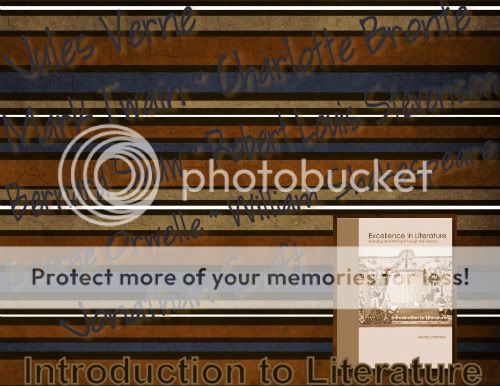
Incorporating studying the classics into the homeschool year is not always an easy thing to do. The idea of reading and analyzing the classics was one of those intimidating tasks that seems to cause me to want to put off even trying because I didn’t even know where to start. I wasn’t even sure how to break it down into manageable size pieces which is rather amusing as that type of thing isn’t usually an issue for me. I tend to jump into things and then get a little overwhelmed. **grin** Yet, the whole literature analysis thing just stopped me cold.
Thankfully, Janice Campbell has taken that task to heart and created Excellence in Literature: Reading and Writing Through the Classics. Her program walks students (and teachers) through the process of analyzing the classics through thorough reading classic literature and then writing analysis papers. She breaks things down into 9 manageable units while helping students learn how to establish their own time table for completing the assignments. Through this course, students will learn not only about literature analysis, but also about time management. Due to the way this program is designed, the students will come out of this class better prepared for college classes.
After reading over all of the introductory material in the course book, Munchkin started out in Unit 1 in the Introduction to Literature course which has a selection of short stories as the source text. This is a little different from the normal unit as students usually will be reading novels or plays during this course. The first unit helps ease students into the program and learn more about the process. There are links to all of the reading selections, so there is nothing additional to purchase for this unit. If you don’t have a good writing handbook, you will want to add that to your homeschool library as that will be extremely helpful when it comes to writing the papers. After reading a couple of the selections and doing the assigned work, Munchkin asked if we could skip the rest of the unit and dive into the real books. Normally, I’m not big on skipping over material, but I agreed in this case as she was rather excited about reading Around the World in 80 Days by Jules Verne.
On to Unit 2… For each unit, students are given a focus text. An additional honors text is given for students who desire to go the honors route with this course. As stated above, in unit 2, Munchkin would be reading Around the World in 80 Days by Jules Verne. (The honors text is 20,000 Leagues Under the Sea by Jules Verne which Munchkin will probably decide to read.) We chose to download the free Kindle version of the book instead of purchasing a hard copy. Munchkin is still able to make notes on the pages as well as highlight key passages/words. She likes reading on the tablet, so it works for us. In addition to reading the focus text, students also learn about the author – in this case, Jules Verne. Throughout the reading, Munchkin takes note of the words that she doesn’t know, and these words become her vocabulary words.
Munchkin reads in the evening before bed, so she highlights and makes notes on the kindle book text while reading. She does not do her vocabulary words in the evening. (She looks them up if she genuinely can not figure out the meaning based upon the use within the text.) Instead, she does her vocabulary work the following day. She had to create a reading schedule that would allow her to complete the book in the time period given (2 weeks). In addition to the reading, she has assignments to complete each week. While the unit is scheduled to last 4 weeks, the reading of the book takes place in the first 2 weeks. The second 2 weeks is spent writing and editing an essay answering the given question. She can also watch the film version of the book if desired. (We will be doing this as it’s fun to compare and contrast between the book and the movie.)

The way these units are written takes a little getting use to for both the student and the teacher as it’s not laid out like a traditional teacher’s manual or student text. Instead, it guides you through doing a study of the author (a plethora of links are given) and the focus text. Students are expected to do their own research on both the author and the focus text. The course doesn’t really teach students how to write the different papers, but it does give a good number of examples. A general assignment schedule is given for each week of the unit, but students need to figure out what they need to do to meet these deadlines. Depending on the student, the parent/teacher may need to help them set up a schedule until they get use to making up their own schedule.
The course contains a rubric for the student to self-check their writing as well as a rubric for the parent/teacher to use for grading purposes. It also has a chart where the grades can be recorded, so students (and parents) can see progress over the length of the course. Something to keep in mind, this a college preparation type course, so there is no nice little answer key where you check off multiple choice or true false answers. Students are showing their understanding of their reading and research by writing papers. Each student will come away with a slightly different perspective on each focus text which may make grading more difficult for the teacher, but it also means that the student should walk away with a deeper understanding of not only the source text and author but also writing mechanics for different types of papers.
The complete Excellence in Literature curriculum is comprised of five courses: Introduction to Literature, Literature & Composition, American Literature, British Literature and World Literature. Each title is available individually in either print ($29+shipping) or electronic ($27) version. You can also purchase the complete package at once for $139+shipping for a print copy or $136 for an eBook copy.
I received an electronic copy of Excellence in Literature as part of the TOS Homeschool Crew to help facilitate the writing of a frank and honest review. A positive review is not guaranteed, and all opinions are my own.

